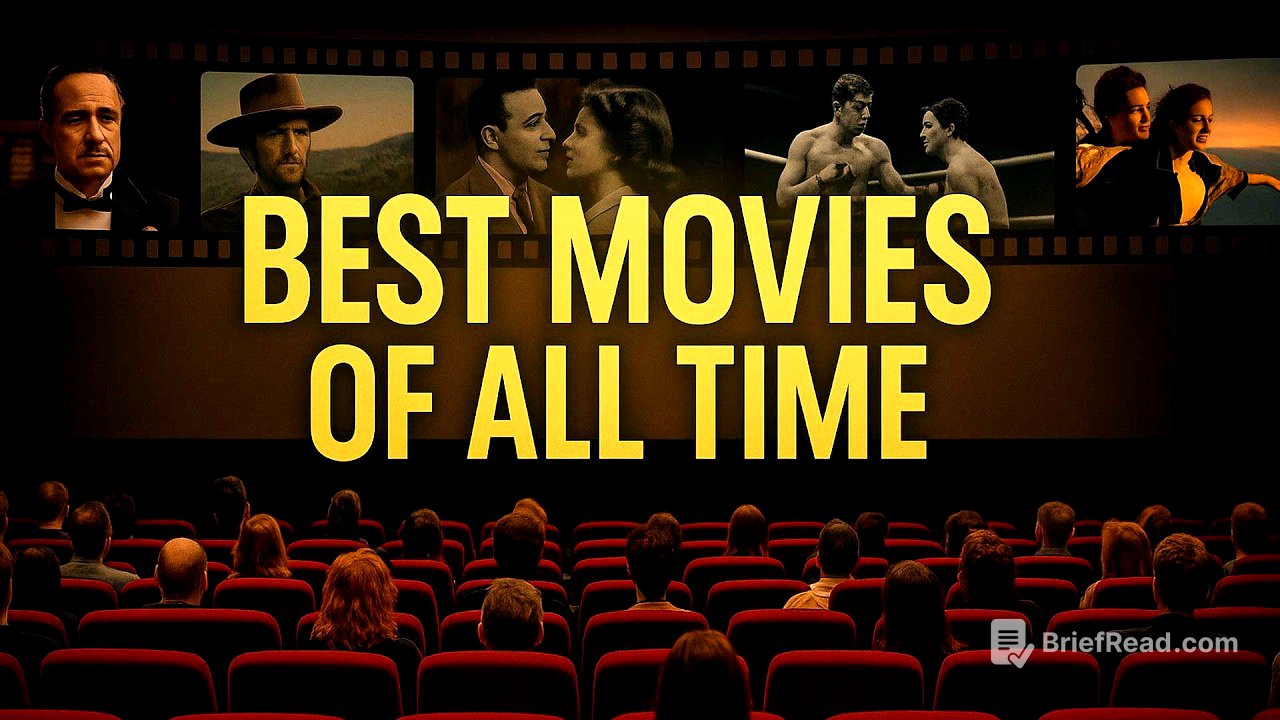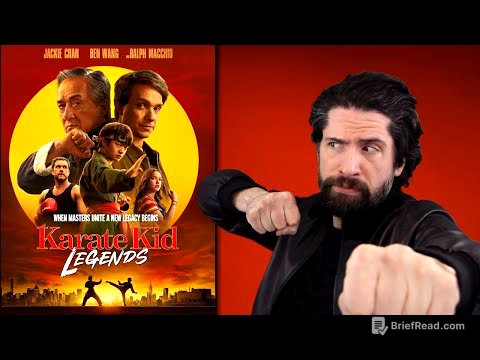TLDR;
This video presents a countdown of the 50 greatest movies of all time, highlighting their cultural impact, innovative techniques, and enduring appeal. The list includes a diverse range of films from various genres and eras, each celebrated for its unique contribution to cinematic history.
- The list spans various genres and eras, showcasing the evolution of filmmaking.
- Each film is recognized for its unique contribution to cinematic history, whether through innovative techniques, powerful storytelling, or cultural impact.
- The countdown aims to inspire both lifelong movie lovers and those new to the world of cinema, encouraging viewers to explore and appreciate these influential films.
50th Place: Rashomon (1950) [0:48]
Akira Kurosawa's "Rashomon" explores the subjectivity of truth through four conflicting accounts of a crime in feudal Japan. A bandit, a samurai's wife, a dead man (via a medium), and a woodcutter each offer a different version of events, challenging the viewer's understanding of objective reality. The film's innovative narrative structure, known as the "Rashomon effect," has become a staple in storytelling.
49th Place: Forrest Gump (1994) [1:37]
Robert Zemeckis' "Forrest Gump" is an American epic that follows the life of Forrest, a kind-hearted man with a low IQ, as he unwittingly participates in defining moments of 20th-century American history. From the Vietnam War to ping-pong diplomacy, Forrest's journey is marked by his enduring love for Jenny and his unwavering optimism. The film is celebrated for its iconic lines, stirring soundtrack, and its timeless message about life.
48th Place: Gladiator (2000) [2:34]
Ridley Scott's "Gladiator" is a historical epic that revitalized the sword and sandal genre. Russell Crowe stars as Maximus, a Roman general betrayed by a corrupt emperor and forced into slavery. As a gladiator, Maximus seeks justice and vengeance for his murdered family. The film combines emotionally charged drama with breathtaking battle sequences and a memorable score by Hans Zimmer.
47th Place: Yi Yi (2000) [3:29]
Edward Yang's "Yi Yi" is a reflective drama that captures the beauty of ordinary life in Taipei. The film follows a multi-generational family as they navigate personal struggles, relationships, and existential questions. Told through the eyes of a father, daughter, and son, the story unfolds with a gentle pace, emphasizing the coexistence of joy and sorrow in daily life.
46th Place: The Mirror (1975) [4:23]
Andrei Tarkovsky's "The Mirror" is a poetic and personal meditation on memory, time, and identity. Structured as a stream of consciousness, the film blends childhood memories, dreams, and historical footage into a nonlinear narrative. The film demands engagement and rewards viewers with profound emotional resonance, hailed as a unique achievement in world cinema.
45th Place: Parasite (2019) [5:16]
Bong Joon-ho's "Parasite" is a dark comedy and social commentary that explores the divide between the wealthy Park family and the impoverished Kim family. As the Kims infiltrate the Park's household under false pretenses, the film delves into themes of class disparity, deception, and inequality. "Parasite" challenges viewers to reflect on societal structures and personal ethics, and it became the first non-English language film to win the Academy Award for Best Picture.
44th Place: Psycho (1960) [6:06]
Alfred Hitchcock's "Psycho" revolutionized the horror genre with its suspense and shocking twists. The story begins with Marion Crane, who checks into the eerie Bates Motel and encounters the peculiar Norman Bates. Hitchcock's direction keeps viewers on edge, utilizing innovative camera techniques and a chilling score to build tension.
43rd Place: Modern Times (1936) [6:57]
Charlie Chaplin's "Modern Times" is a satire that addresses the struggles of the working class during the Great Depression. Chaplin's character navigates the challenges of an industrialized society that values efficiency over humanity. The film critiques the dehumanizing effects of modern machinery and the relentless pursuit of productivity.
42nd Place: Pan's Labyrinth (2006) [7:50]
Guillermo del Toro's "Pan's Labyrinth" is a dark fairy tale set against the backdrop of post-Civil War Spain. The film follows Ofelia, who discovers a mysterious labyrinth and meets a fawn who sets her on a path filled with magical trials. Del Toro intertwines fantasy and reality, exploring themes of innocence, resistance, and the power of imagination.
41st Place: Dune: Part One (2021) [8:43]
Denis Villeneuve's "Dune: Part One" brings to life the epic saga of Paul Atreides, a young noble thrust into a destiny beyond his understanding. Set on the desert planet Arrakis, the film explores themes of politics, prophecy, and survival. With visuals, a haunting score, and a star-studded cast, "Dune" immerses viewers in a detailed universe.
40th Place: Fight Club (1999) [9:37]
David Fincher's "Fight Club" is an exploration of identity, consumerism, and the modern male psyche. The film follows an unnamed narrator who forms an underground fight club with the enigmatic Tyler Durden. As the club evolves into a radical organization, the narrator grapples with his fractured identity and the consequences of their actions.
39th Place: Pulp Fiction (1994) [10:23]
Quentin Tarantino's "Pulp Fiction" weaves together multiple narratives of crime, redemption, and fate in Los Angeles. Through its nonlinear structure, the film explores the lives of hitmen, a boxer, and a gangster's wife, among others. Tarantino's dialogue, eclectic soundtrack, and violence create a cinematic experience.
38th Place: Interstellar (2014) [11:16]
Christopher Nolan's "Interstellar" is a science fiction epic that explores humanity's quest for survival beyond Earth. Set in a future where environmental disasters threaten human existence, the film follows Cooper, a former NASA pilot, on a mission through a wormhole to find a new habitable planet.
37th Place: Terminator 2: Judgment Day (1991) [12:08]
James Cameron's "Terminator 2: Judgment Day" is a sci-fi action film that raises the stakes from its predecessor. The film introduces a more advanced Terminator, the T-1000, sent back in time to eliminate young John Connor. Another Terminator, the T-800, is reprogrammed to protect John.
36th Place: The Rules of the Game (1939) [13:01]
Jean Renoir's "The Rules of the Game" is a satirical masterpiece that dissects the moral decay of the French aristocracy on the eve of World War II. Set in a lavish country estate, the film follows a group of upper-class individuals and their servants as they engage in romantic entanglements and social gamesmanship.
35th Place: City of God (2002) [13:48]
Fernando Meirelles and Kátia Lund's "City of God" is a journey into the heart of Rio de Janeiro's favelas, chronicling the rise of organized crime from the 1960s through the 1980s. The film captures the realities of gang warfare, poverty, and the struggle for survival.
34th Place: Andrei Rublev (1966) [14:42]
Andrei Tarkovsky's "Andrei Rublev" explores the role of the artist in a world of chaos and suffering. Set in medieval Russia, the film follows the life of Andrei Rublev, a revered icon painter, as he confronts violence, religious doubt, and creative paralysis.
33rd Place: The Good, the Bad and the Ugly (1966) [15:39]
Sergio Leone's "The Good, the Bad and the Ugly" is a western epic that defined an era of cinema. Set during the American Civil War, it follows three men as they race to uncover a hidden fortune in gold.
32nd Place: Amadeus (1984) [16:33]
Milos Forman's "Amadeus" is an exploration of genius and jealousy told through the recollections of composer Antonio Salieri. The film recounts the rise and fall of Wolfgang Amadeus Mozart in 18th-century Vienna.
31st Place: Raging Bull (1980) [17:31]
Martin Scorsese's "Raging Bull" is a portrait of rage, redemption, and self-destruction. Based on the life of boxer Jake LaMotta, the film follows his rise in the ring and his fall in his personal life.
30th Place: Rear Window (1954) [18:23]
Alfred Hitchcock's "Rear Window" is a suspense masterwork that turns curiosity into intrigue. A photojournalist confined to a wheelchair spies on his neighbors and suspects one of them may have committed a murder.
29th Place: The Matrix (1999) [19:16]
The Wachowskis' "The Matrix" explores the nature of reality and human consciousness. A computer hacker discovers that the world he knows is a simulated reality created by intelligent machines.
28th Place: Blade Runner (1982) [20:04]
Ridley Scott's "Blade Runner" is a sci-fi classic that continues to influence generations of filmmakers. Set in a dystopian Los Angeles in 2019, the film follows Rick Deckard, a detective tasked with tracking down rogue replicants.
27th Place: In the Mood for Love (2000) [21:00]
Wong Kar-wai's "In the Mood for Love" is a masterclass in emotional restraint and visual poetry set in 1960s Hong Kong. Two neighbors form a bond after discovering their spouses are having an affair.
26th Place: Dr. Strangelove or: How I Learned to Stop Worrying and Love the Bomb (1964) [21:53]
Stanley Kubrick's "Dr. Strangelove" is a satire that turns the prospect of nuclear annihilation into comedy. The film follows a cascade of events after a deranged U.S. general orders a nuclear strike on the Soviet Union.
25th Place: The Silence of the Lambs (1991) [22:53]
Jonathan Demme's "The Silence of the Lambs" is a psychological thriller that transcends the genre. An FBI trainee interviews Hannibal Lecter in hopes of catching another killer.
24th Place: Doctor Zhivago (1965) [23:51]
David Lean's "Doctor Zhivago" is a romantic epic set against the backdrop of early 20th-century Russia. Yuri Zhivago is torn between his love for his wife and his affair with Lara.
23rd Place: The Spirit of the Beehive (1973) [24:50]
Víctor Erice's "The Spirit of the Beehive" is a poetic film set in post-Civil War Spain. A young girl becomes fascinated by the film "Frankenstein."
22nd Place: 12 Angry Men (1957) [25:43]
Sidney Lumet's "12 Angry Men" is a courtroom drama that delves into the American justice system. Twelve jurors deliberate the fate of a teenage boy accused of murder.
21st Place: Titanic (1997) [26:37]
James Cameron's "Titanic" intertwines a fictional love story with the tragedy of the RMS Titanic sinking. Rose, an aristocrat, and Jack, a penniless artist, fall in love aboard the ship.
20th Place: Lawrence of Arabia (1962) [27:34]
David Lean's "Lawrence of Arabia" chronicles the life of T.E. Lawrence, a British officer who played a role in the Arab Revolt during World War I.
19th Place: West Side Story (1961) [28:27]
"West Side Story" portrays the rivalry between two teenage gangs, the Jets and the Sharks, in 1950s New York City. Tony, a former Jet, falls in love with Maria, the sister of the Sharks leader.
18th Place: Gone with the Wind (1939) [29:26]
Victor Fleming's "Gone with the Wind" is a historical epic set against the backdrop of the American Civil War and Reconstruction era. The film chronicles the life of Scarlett O'Hara.
17th Place: Goodfellas (1990) [30:11]
Martin Scorsese's "Goodfellas" offers a look into the rise and fall of mob associate Henry Hill, spanning from the 1950s to the 1980s.
16th Place: The Sound of Music (1965) [31:01]
"The Sound of Music" blends warmth, romance, and historical drama with songs. Based on the story of the Von Trapp family, it follows Maria, who becomes a governess to seven children.
15th Place: Sunset Boulevard (1950) [31:50]
Billy Wilder's "Sunset Boulevard" is an exploration of fame, obsession, and the dark side of Hollywood. A screenwriter becomes entangled with Norma Desmond, a faded silent film star.
14th Place: On the Waterfront (1954) [32:44]
Elia Kazan's "On the Waterfront" delves into the corruption and violence plaguing the longshoreman's unions of Hoboken, New Jersey. A former boxer becomes entangled in a moral dilemma.
13th Place: Star Wars: Episode IV - A New Hope (1977) [33:40]
George Lucas' "Star Wars: Episode IV - A New Hope" revolutionized the science fiction genre. Luke Skywalker becomes entangled in the Rebel Alliance's fight against the Galactic Empire.
12th Place: Apocalypse Now (1979) [34:33]
Francis Ford Coppola's "Apocalypse Now" is an exploration of the human psyche amidst the chaos of war. Captain Willard is on a mission to assassinate Colonel Kurtz in the Cambodian jungle.
11th Place: The Lord of the Rings: The Return of the King (2003) [35:18]
Peter Jackson's "The Lord of the Rings: The Return of the King" concludes the trilogy with grandeur and emotional depth. Frodo and Sam approach Mount Doom to destroy the One Ring.
10th Place: The Shawshank Redemption (1994) [36:06]
Frank Darabont's "The Shawshank Redemption" is a tale of hope, friendship, and perseverance set within Shawshank State Penitentiary. Andy Dufresne forms a bond with fellow inmate Ellis "Red" Redding.
9th Place: Vertigo (1958) [36:56]
Alfred Hitchcock's "Vertigo" is an exploration of obsession, identity, and the nature of reality. A retired detective is hired to follow a woman exhibiting strange behavior.
8th Place: 2001: A Space Odyssey (1968) [37:52]
Stanley Kubrick's "2001: A Space Odyssey" explores humanity's evolution, artificial intelligence, and the unknown realms of space.
7th Place: Schindler's List (1993) [38:49]
Steven Spielberg's "Schindler's List" portrays the Holocaust, focusing on Oscar Schindler, who saved over a thousand Jews by employing them in his factories.
6th Place: The Godfather Part II (1974) [39:41]
Francis Ford Coppola's "The Godfather Part II" serves as both a sequel and a prequel, following Michael Corleone as he consolidates power and tracing the early life of Vito Corleone.
5th Place: Citizen Kane (1941) [40:34]
Orson Welles' "Citizen Kane" investigates the life of Charles Foster Kane through the lens of his final word, "Rosebud."
4th Place: Seven Samurai (1954) [41:30]
Akira Kurosawa's "Seven Samurai" follows a village of poor farmers who hire seven masterless samurai to defend them from bandits.
3rd Place: Casablanca (1942) [42:29]
Michael Curtiz's "Casablanca" is a romantic drama set against the backdrop of World War II. Rick Blaine's world is turned upside down when Ilsa Lund walks back into his life.
2nd Place: Ben-Hur (1959) [43:17]
William Wyler's "Ben-Hur" intertwines personal vengeance with spiritual redemption. Judah Ben-Hur is betrayed by his childhood friend, Messala.
1st Place: The Godfather (1972) [44:17]
Francis Ford Coppola's "The Godfather" is an epic saga of family, power, and corruption. The Corleone crime family navigates shifting loyalties and rising violence.









